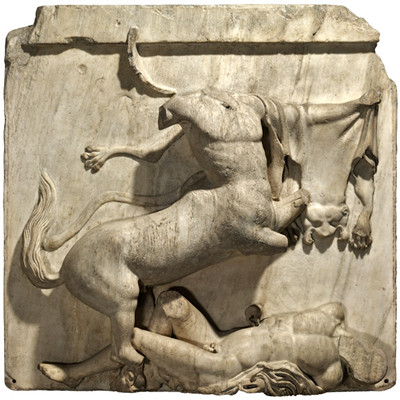You might expect that because the Parthenon is called a temple, it would have been a place of prayer and sacrifice;
你也許會認為,帕臺農名為神廟,一定是個祭祀與祈禱的所在。
in fact, it became a treasury-a war-chest to finance the defence of Greece against the Persians.
但事實上這里成了雅典的金庫:希波戰爭的軍費來源。
In time, though, this fighting fund became protection money, demanded by Athens from the other Greek cities when Athens placed itself at the head of them.
后來軍費變成保護費,雅典以老大自居,要求希臘的其他城邦向它繳納費用,
It forced them into becoming satellites of its growing maritime empire.
強迫它們成為不斷壯大的雅典海上帝國的附庸。
And a great chunk of that money was siphoned off by the Athenians to fund the Acropolis building programme.
其中一大筆錢被雅典用于修建衛城。
Here's Mary Beard again, on the non-Athenian view of the Parthenon:
瑪麗?彼爾德告訴我們,雅典以外的希臘人是這么看待帕臺農的。
"I think the Parthenon must have been the kind of building that you spat at and kicked if you could.
帕臺農神廟是那種讓人想往上吐口水,如果可能的話還要踢上一腳的建筑物。
You knew, if you were one of Athens' subjects, that this was a statement of your own subordination.
如果你是雅典的附屬城邦之一,它就是你屈從的標志。
There was a clear and vociferous faction in Athens when the Parthenon was built, which said the money shouldn't be spent that way.
神廟修建時,雅典城內反對的聲音很大,認為不能這樣揮霍錢財。
That this was, in the words of one, dressing Athens up like a harlot.
還說它把雅典城裝扮得像個妓女。
Now, that's very odd, I think, for us to empathise with now, because the Parthenon sculptures seem so austerely beautiful, I think, it's hard to think of them in terms of prostitution.
這樣的描述今人恐怕很難理解,因為在我們眼里,帕臺農雕像深具樸素之美,很難令人聯想到淫邪。
It's very discomfiting, I think, to think of our touchstone of good classical taste as having appeared vulgar.
被我們視為古典美基準的物品,曾被人視為粗俗,這實在讓人難以接受。
But it clearly did, to some."
但在當時,對一些人來說的確如此。
One of the many extraordinary things about the Parthenon is that it's meant so many different things to different people at different times.
帕臺農神廟的另一個奇特之處,是它在不同的歷史時期,對不同的人群具有不同的意義。












